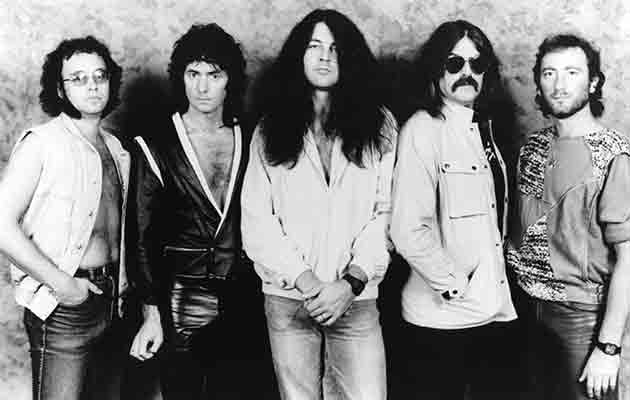MARK I AND II SINGLES
PURPLE, 1973
Fabulous double comp issued in a variety of rather sexist sleeves: lady in jeans (1973), lady in swimming costume (1978), or sexy lady welder (1979). Whatever, a testament to how DP could unexpectedly turn its hand to singles.
https://www.youtube.com/watch?v=7_eF6j_9xXY
IAN GILLAN: Singles, we hated it, going on Top Of The Pops and all that rubbish. I remember Ritchie played TOTP with his guitar back to front so his strings were on the inside – I don’t think we got asked back after that. You get embraced and consumed. People say, “Ah, it’s good for you…” But it’s not.
IAN PAICE: We weren’t militant about it, but we always thought we were an albums band, man. But everyone released singles: Hendrix, Cream. Even if it wasn’t the intention of the recording. It’s down to the record company to say, “That’s coming out as a single.” You just get on with it.
ROGER GLOVER: “Black Night” was the management’s idea of a lead track. To have that success – it feels like it’s out of your control.
IAN PAICE: Some of the singles are quite interesting. We never contemplated “Smoke On The Water” as anything other than part of the Machine Head album. It was only when the master tapes went over to California and Warner Bros that some guy there said “This track is really good – but it’s too long.” And so they chopped out a couple of minutes in the middle, chucked it out, and it went crazy.
________________________
PERFECT STRANGERS
POLYDOR, 1984
The 1980s. Wilderness years profitably cultivated by the reformed classic lineup.
IAN GILLAN: I went for a curry with Rodney Marsh – I was a huge QPR fan, and he came to see the Gillan band at Hammersmith Odeon. We went for a few beers afterwards and when he ran out of compliments, he said “…but it’s not as good as Deep Purple.” And of course he was right. I thought of that, and I gave Jon Lord a call the next day to sound things out.
ROGER GLOVER: I wasn’t sure it was a good idea. Maybe because I wasn’t sure whether it would work in the ’80s. We had this meeting, and when it did happen all of us sitting round the table, the five of us, it was an amazing feeling.
IAN PAICE: As silly as it sounds, it was like going home – everyone set up and started playing. It felt very easy and very natural. It was like, why did we ever stop?
IAN GILLAN: We set up in a rented house in Vermont, started jamming, and you could see people smiling and nodding. Then we all went out and got pissed – it was great. But things changed for the next one: this megalomaniac appeared out of nowhere playing the banjo – and that’s when things had to change again.



